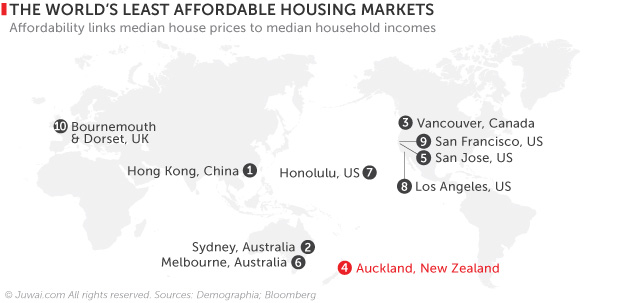亚洲新闻
- 主页
- 新闻
- 亚洲新闻
You've successfully copied this link.
How will Chinese buyers react to New Zealand's new ban?

A potential ban on foreign buyers is looming in New Zealand, but Chinese buyers could be snapping up Kiwi homes before that happens.
New Zealand’s newly-elected Prime Minister Jacinda Ardern is seeking to ban foreign buyers from purchasing existing Kiwi homes by pushing for changes to the New Zealand Overseas Investment Act before the Trans-Pacific Partnership (TPP) deal comes into effect.1
Auckland – New Zealand’s largest city – is currently the world’s fourth-least affordable property market, after Hong Kong, Sydney, and Vancouver2, and Ardern aims to make home ownership more attainable for Kiwi citizens with this cooling measure.1

If passed, the new legislation could mean New Zealand will join neighbouring Australia in restricting foreign buyers – classified as non-residents and non-citizens – from purchasing residential property unless it is newly-built.
Impact on Chinese buying in New Zealand
At this point, how this move will affect Chinese property investment in New Zealand remains up in the air. According to Bloomberg1 and Savills3, though, such measures have not been very effective in dampening price hikes and Chinese buyer interests in other equally unaffordable property investment hotspots, such as Australia, Canada, and Hong Kong.2
That said, with New Zealand being one of the top 10 most popular investment destinations for Chinese buyers on Juwai.com4, we could see a possible rise in enquiries from mainland buyers keen to invest before the restriction, which could be introduced before Christmas and take effect in early 2018.3, 5
This is because Chinese homebuyers have shown a tendency in the past to speed up their plans to purchase overseas properties when new taxes or restrictions are in the cards, such as in Vancouver and Sydney when new foreign buyer taxes were announced.
"They could cause buyers to front-load activity they already plan for next year. One premium buyer in Sydney closed his transaction 15 minutes to midnight before the new regime kicked in," said Jane Lu, Juwai.com Head of Australia and New Zealand to China Daily.
More importantly, this new policy will only restrict Chinese homebuyers from purchasing secondhand homes. With the new Labour-led government planning to build 100,000 new homes over the next 10 years under the KiwiBuild scheme, this means New Zealand could still be a viable choice for them.6, 7
The NZ government is also contemplating plans to build a satellite city in South Auckland that, by 2050, could potentially house 500,000 people merely 30 minutes away from central Auckland.7
Chinese interest in New Zealand
Having said that, there will be the inevitable Chinese buyer who may prefer to wait and see first, or perhaps switch focus to another investment destination. Still, this doesn’t mean that New Zealand will no longer appeal to mainland buyers even after the new policy takes effect.
Chinese are a pragmatic bunch who not only rolls well with the punches, but are also generational investors who tend to look at long-term gains and opportunities. So, for Chinese homebuyers, this new policy could just mean a change in investment strategy as they figure out a way to continue buying in New Zealand – just like when Australia imposed a similar policy.
For now, though, with New Zealand being one of the 65 countries aboard the ‘One Belt, One Road’ (OBOR) initiative8, as well as a rising tourist destination for Chinese, Chinese interest in New Zealand is likely to remain steady.
Already, Chinese are the second-largest group of tourists and next biggest spenders in New Zealand.9 By 2023, the Ministry of Business, Innovation and Employment in New Zealand predicts tourists from China to surge to 913,000 and for their spending to rise to $4.34 billion.10
With New Zealand set to welcome even more Chinese tourists and investors, it’s quite feasible for its real estate sector to experience a spillover effect and see more property investors from China as well, especially as New Zealand appeals so much to Chinese from many different aspects.
Find out 4 reasons why Chinese buyers like New Zealand here.
Sources: 1. Bloomberg: New Zealand bans foreign home buyers after price surge; 2. Demographia; 3. Domain: New Zealand follows through with ban on foreigners buying established properties; 4. Juwai IQ Data, Q3 2017; 5. New Zealand Herald: Ban on foreign house buyers by early 2018 – but Aussie buyers exempt; 6. Macro Business: NZ PM Jacinda Ardern pledges widespread NZ housing reform; 7. New Zealand Herald: South Auckland satellite city gives Government room to expand; 8. China Daily: Road starts here – New Zealand to catch the ‘Belt and Road’ train; 9. Statistics New Zealand; 10. New Zealand Ministry of Business, Innovation and Employment;
[Image source: Catrin Owens on Stuff]
喜欢这篇文章?免费注册,获取居外亚洲市场的最新资讯!
排序
- 2023
- 2022
- 2021
- 2020
- 2019
- 2018
- 2017
- 2016
- 2015
- 2014
- 2013
- 2012
标签
- australia
- china
- chinese buyers
- investment
- juwai
- property
- real estate
- residential
- united kingdom
- united states
Thank you for subscribing to Juwai News!
Sign up for a Juwai Account now for free to enjoy FREE download access to country-specific reports on Chinese property investments.
Do you want to sign up now? Or continue if you have already signed up or you will do it later.


